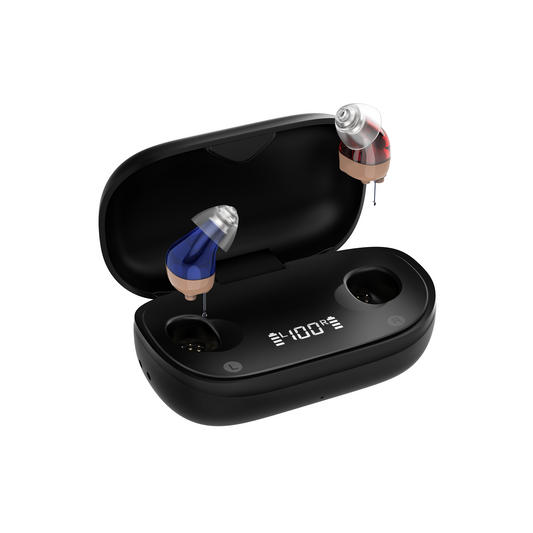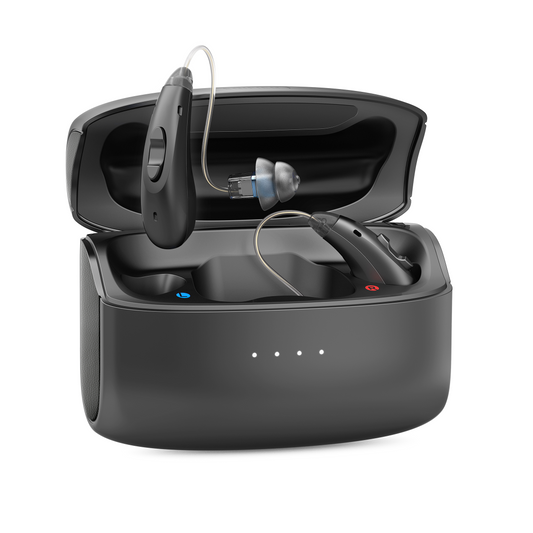How to Choose a Hearing Aid: A Complete Guide
 Hearing aids are life-changing devices that help people reconnect with the world around them. But with so many options available, choosing the right hearing aid can feel overwhelming. In this guide, we’ll walk you through everything you need to know to make the best choice for your lifestyle, hearing loss, and personal preferences.
Hearing aids are life-changing devices that help people reconnect with the world around them. But with so many options available, choosing the right hearing aid can feel overwhelming. In this guide, we’ll walk you through everything you need to know to make the best choice for your lifestyle, hearing loss, and personal preferences.
1. Understand Your Hearing Loss
Before choosing a hearing aid, it’s essential to understand the type and degree of your hearing loss.
-
Mild to moderate hearing loss: Often treated with behind-the-ear (BTE) or in-the-ear (ITE) devices.
-
Severe to profound hearing loss: May require more powerful BTE or custom-fit hearing aids.
-
Frequency-specific loss: Some digital hearing aids allow for customized amplification of specific sound frequencies.
A professional hearing test is the first step — it gives your audiologist the information needed to recommend the best device.
2. Consider Hearing Aid Styles
Hearing aids come in several styles, each with its own benefits:
-
Behind-the-Ear (BTE): Sits comfortably behind the ear, suitable for all ages and levels of hearing loss.
-
Receiver-in-Canal (RIC): Small and discreet, with the speaker inside the ear canal.
-
In-the-Ear (ITE): Custom-made to fit the outer ear, easy to handle and control.
-
Completely-in-Canal (CIC): Almost invisible, ideal for mild to moderate hearing loss.

Choosing the right style depends on comfort, lifestyle, and aesthetic preference.
3. Evaluate Features That Matter
Modern hearing aids come packed with technology. Consider these features when making your decision:
-
Digital Sound Processing: Enhances speech clarity and reduces background noise.
-
Directional Microphones: Focus on the sounds you want to hear.
-
Bluetooth Connectivity: Stream calls, music, and TV directly to your hearing aids.
-
Rechargeable Batteries: Offers convenience and reduces the need for frequent battery changes.
-
Customizable Apps: Adjust volume and sound settings from your smartpho

Prioritize features that match your daily routine and lifestyle.
4. Think About Your Lifestyle
Ask yourself:
-
Do you spend a lot of time in noisy environments?
-
Do you want to stream music or phone calls?
-
How important is discretion and aesthetics?

Lifestyle considerations often guide which hearing aid style and features are most suitable.
5. Work With a Hearing Care Professional
A professional audiologist or hearing specialist can help:
-
Conduct a detailed hearing test.
-
Recommend devices based on your hearing profile.
-
Adjust the hearing aid for optimal performance.
-
Provide ongoing support and follow-up appointments.

Working with a hearing care professional often comes with additional costs.
6. Budget and Insurance
Hearing aids range in price depending on technology, style, and features.
-
Some insurance plans may cover part of the cost.
-
Rechargeable models or devices with advanced features typically cost more but offer long-term convenience.
Evaluate your budget while keeping in mind that a good hearing aid is an investment in your quality of life.
7. Try Before You Buy
Whenever possible, try the hearing aids before committing:
-
Many providers offer trial periods.
-
Test them in different environments (quiet room, restaurant, outdoor settings).
-
Adjustments during the trial period help ensure you get the best fit and performance.
Conclusion
Choosing the right hearing aid is a combination of understanding your hearing loss, evaluating styles and features, considering your lifestyle, and working with a professional. Modern hearing aids offer clarity, comfort, and connectivity, empowering you to hear what matters most.
At Tomore, we offer a wide range of digital, rechargeable, and Bluetooth-enabled hearing aids designed to fit every lifestyle. Explore our All Hearing Aids collection and start your journey to better hearing today.



